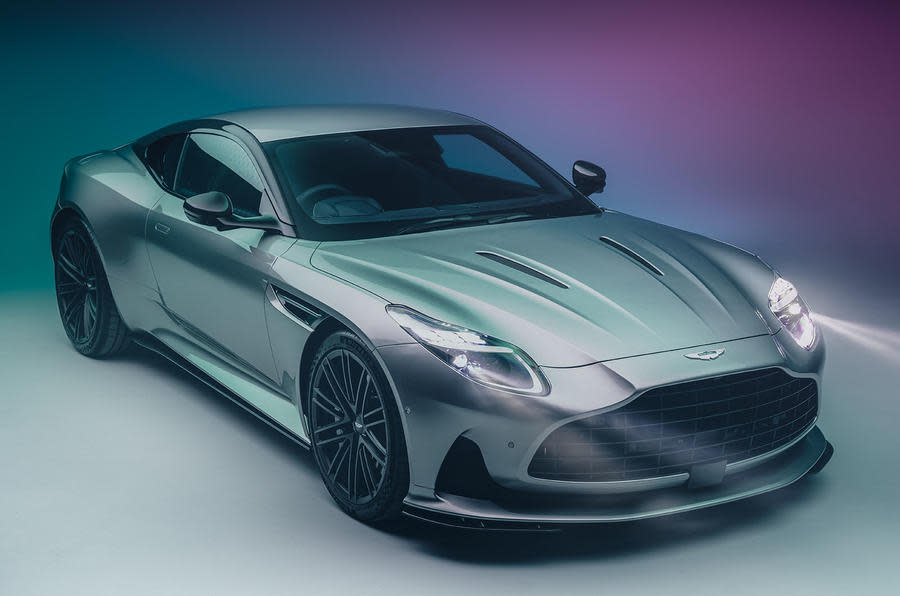Aston Martin to keep combustion cars on sale well into 2030s

- Oops!Something went wrong.Please try again later.
The DB12 will be far from Aston Martin's final combustion car
There will “always be demand” for combustion-engined cars, according to Aston Martin executive chairman Lawrence Stroll, who has pledged to keep selling them for as long as he is legally allowed to.
Aston Martin recently pushed back its plans to launch its first electric car in 2025 to 2027 and has increased investments in plug-in hybrid technology accordingly.
Stroll expects plug-in hybrids to be far more than a 'bridging' technology and to remain on sale well into the middle of the 2030s and beyond. Aston customers have told dealers that they want “sounds and smells” and favour ICE technology for their cars, according to Stroll.
Aston's first EV
Aston Martin has developed a bespoke EV architecture and plans to launch four electric cars on it – a GT, SUV, crossover and ‘mid-engined’ supercar – but they won't hit the market before 2027 after a reveal of the first model in late 2026.
"We have designed and ready one platform to take four different vehicles," Stroll told Autocar. "We have all the products technically engineered and physically designed.
“We planned to launch at the end of 2025 and were ready to do so, but it seems there is a lot more hype in EVs, politically driven or whatever, than consumer demand, particularly at an Aston Martin price point."
He added that demand for electric cars is particularly weak in the luxury segments, as Aston Martins were typically not 'first' cars for their customers and used more for leisure.
Stroll said Aston "will get there" with electric cars, "but at the previously [stated] date, definitely not".
PHEV investment
In delaying the EVs, Stroll said Aston had "decided to invest very heavily in PHEVs" – technology, he said, that would "play out for a long while and we will have an extensive offering".
The company's PHEV technology will be based around V8s, as customers aren't keen on V6s, said Stroll. The V8 engines will still be sourced from Mercedes-AMG throughout the PHEV era. Stroll said Aston would add hybrid technology to its V12 too.
The PHEVs will be based on Aston Martin’s existing architectures and are likely to be introduced into existing model lines. Stroll wouldn't confirm which Aston would be the first to get plug-in hybrid technology, but the Aston Martin DBX would be an obvious contender, given its position as Aston's best-selling car.
Indeed, when it comes to EVs, Stroll expects SUVs to become fully electric in the luxury segments before sports cars.
On PHEVs, Stroll said he "doesn't see demand slowing at all" for them until at least the mid-2030s, and they were compelling for car makers like Aston for being able to offer electric-only running for urban driving and then huge amounts of performance elsewhere. "They will last a lot longer than people thought even a year ago," he said.
They also allow internal combustion engines to live on, and Stroll said: "For as long as we're allowed to make ICE cars, we'll make them. I think there will always be demand, even if it's small."
Mid-engined Astons
Stroll confirmed the Aston Martin Valhalla mid-engined supercar was on track to be revealed and delivered to the first customers by the end of this year.
The V8 will be Aston's first hybrid model and Stroll said the first full year of production was sold out.
The Valhalla will be limited to 999 coupé variants initially but Stroll said the platform would be used for derivatives to ensure that Aston always had a presence in the mid-engined segment.
Existing range refresh
The new Aston Martin Vantage will soon be with dealers, joining the Aston Martin DB12, which was launched late last year. The DB12's launch was delayed by software problems caused by Aston developing its own HMI for the first time ever.
However, Stroll said those issues were now behind Aston and would not be repeated on the Vantage and beyond because it's a plug-and-play system carried over between models.
A refresh for the DBX and a replacement for the Aston Martin DBS are both imminent, something that would give Aston dealers "four new products in 12 months, when we'd done four products in 10 years before", said Stoll.
]]>

